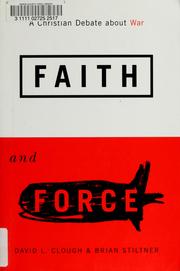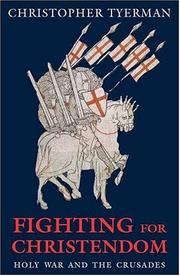| Listing 1 - 10 of 46 | << page >> |
Sort by
|
Book
ISBN: 1443884782 9781443884785 9781443881067 1443881066 Year: 2015 Publisher: Newcastle upon Tyne Cambridge Scholars Publishing
Abstract | Keywords | Export | Availability | Bookmark
 Loading...
Loading...Choose an application
- Reference Manager
- EndNote
- RefWorks (Direct export to RefWorks)
This collection of essays examines interactions of war, peace and religion in the United States, a country where religious faith was, and still is, often deeply felt and widely held, where faith has provided a set of values to uphold with fervor or to transgress in protest, and where religion has been used to legitimize both armed violence and passive resistance. These essays analyze the mythos of America as a place of religious freedom, yet one imbued with a socially-imposed civil religion and underpinned by a heavy presumption of Protestant dominance. With subjects ranging from the War of In
War --- Christianity and war --- Religious aspects --- Christianity. --- United States --- Religion.
Book
ISBN: 0191652938 1299803040 019967261X 0191765082 9780191652936 9781299803046 0191652946 Year: 2013 Publisher: Oxford Oxford Scholarship Online
Abstract | Keywords | Export | Availability | Bookmark
 Loading...
Loading...Choose an application
- Reference Manager
- EndNote
- RefWorks (Direct export to RefWorks)
Against the domination of moral deliberation by rights-talk, 'In Defence of War' asserts that belligerency can be morally justified, even while it is tragic and morally flawed. Recovering the early Christian tradition of just war thinking Nigel Biggar argues in favour of aggressive war in punishment of grave injustice.
Just war doctrine. --- War --- Religious aspects --- Christianity. --- Christianity and war --- Jus ad bellum --- War (Philosophy) --- Moral and ethical aspects

ISBN: 1589013182 1435627229 9781435627222 9781589013186 9781589011656 1589011651 Year: 2007 Publisher: Washington, D.C.
Abstract | Keywords | Export | Availability | Bookmark
 Loading...
Loading...Choose an application
- Reference Manager
- EndNote
- RefWorks (Direct export to RefWorks)
From the ancient battles between Greek city-states to the Crusades to the World Wars of the twentieth-century to the present-day wars in Afghanistan and Iraq and the Middle East, aggressors and defenders alike have claimed the mantle of righteousness and termed their actions just. But can the carnage of war ever be morally grounded? And if so, how? These are the questions that David L. Clough, a Methodist proponent of pacifism, and Brian Stiltner, a Catholic theologian and just war adherent, have vowed to answer—together. With one voice, Clough and Stiltner outline and clarify issues of humanitarian intervention, weapons proliferation, and preventative war against rogue states. Their writing is grounded in Christian tradition and provides a fresh and illuminating account of the complexities and nuances of the pacifist and just war positions. In each chapter Clough and Stiltner engage in debate on the issues, demonstrating a respectful exchange of ideas absent in much contemporary political discourse—whether on television or in the classroom. The result is a well-reasoned, challenging repartee that searches for common ground within the Christian tradition and on behalf of the faithful promotion of justice—yet one that also recognizes genuine differences that cannot be bridged easily. Intended for a broad audience, Faith and Force is the perfect foil to the shrill screeching that surrounds partisan perspectives on military power and its use.
War --- Pacifism --- Just war doctrine. --- Jus ad bellum --- War (Philosophy) --- Christianity and war --- Religious aspects --- Christianity. --- Moral and ethical aspects --- Just war doctrine --- Christianity
Book
ISBN: 1498507115 9781498507110 9781498507103 Year: 2015 Publisher: Lanham, Maryland
Abstract | Keywords | Export | Availability | Bookmark
 Loading...
Loading...Choose an application
- Reference Manager
- EndNote
- RefWorks (Direct export to RefWorks)
Recovering Christian Realism develops an account of just war theory as a political ethic grounded explicitly in a Christian theory of political authority. It advances a defense of Christian realism, explains the role played by power in peacemaking, and suggests the outlines for a Christian theory of international relations.
War --- Just war doctrine. --- Jus ad bellum --- War (Philosophy) --- Christianity and war --- War and morals --- Moral and ethical aspects. --- Religious aspects --- Christianity. --- Moral and ethical aspects
Book
ISBN: 1108235395 1108245994 110841589X Year: 2018 Publisher: Cambridge, England : Cambridge University Press,
Abstract | Keywords | Export | Availability | Bookmark
 Loading...
Loading...Choose an application
- Reference Manager
- EndNote
- RefWorks (Direct export to RefWorks)
Just war thinking and realism are commonly presumed to be in opposition. If realists are seen as war-mongering pragmatists, just war thinkers are seen as naïve at best and pacifistic at worst. Just war thought is imagined as speaking truth to power - forcing realist decision-makers to abide by moral limits governing the ends and means of the use of force. Realist Ethics argues that this oversimplification is not only wrong, but dangerous. Casting just war thought to be the alternative to realism makes just war thinking out to be what it is not - and cannot be: a mechanism for avoiding war. A careful examination of the evolution of just war thinking in the Christian, Islamic, and Hindu traditions shows that it is no stranger to pragmatic politics. From its origins, just war thought has not aimed to curtail violence, but rather to shape the morally imaginable uses of force, deeming some of them necessary and even obligatory. Morkevičius proposes here a radical recasting of the relationship between just war thinking and realism.
Just war doctrine. --- War --- War (Islamic law) --- Islamic law --- Christianity and war --- Jus ad bellum --- War (Philosophy) --- Religious aspects --- Christianity. --- Hinduism. --- Moral and ethical aspects
Book
ISBN: 1009106619 1009116762 1009098934 1009116568 Year: 2022 Publisher: Cambridge, United Kingdom ; New York, NY : Cambridge University Press,
Abstract | Keywords | Export | Availability | Bookmark
 Loading...
Loading...Choose an application
- Reference Manager
- EndNote
- RefWorks (Direct export to RefWorks)
In this volume, Mark Douglas presents an environmental history of the Christian just war tradition. Focusing on the transition from its late medieval into its early modern form, he explores the role the tradition has played in conditioning modernity and generating modernity's blindness to interactions between 'the natural' and 'the political.' Douglas criticizes problematic myths that have driven conventional narratives about the history of the tradition and suggests a revised approach that better accounts for the evolution of that tradition through time. Along the way, he provides new interpretations of works by Francisco de Vitoria and Hugo Grotius, and, provocatively, the Constitution of the United States of America. Sitting at the intersection of just war thinking, environmental history, and theological ethics, Douglas's book serves as a timely guide for responses to wars in a warming world as they increasingly revolve around the flashpoints of religion, resources, and refugees.
Just war doctrine. --- War --- Religious aspects --- Christianity. --- Moral and ethical aspects. --- Christianity and war --- War (Philosophy) --- Jus ad bellum --- War and morals --- Moral and ethical aspects
Book
ISBN: 0585239924 9780585239927 0836134974 Year: 1989 Publisher: Scottdale, Pa. Herald Press
Abstract | Keywords | Export | Availability | Bookmark
 Loading...
Loading...Choose an application
- Reference Manager
- EndNote
- RefWorks (Direct export to RefWorks)
War --- Peace --- Just war doctrine --- Religion --- Philosophy & Religion --- Christianity --- Jus ad bellum --- War (Philosophy) --- Historic peace churches --- Christianity and war --- Religious aspects --- Moral and ethical aspects --- Just war doctrine. --- Christianity.
Book
ISBN: 3110733137 9783110733136 3110738058 3110733269 9783110738056 9783110733266 Year: 2021 Publisher: Berlin: Walter de Gruyter ,
Abstract | Keywords | Export | Availability | Bookmark
 Loading...
Loading...Choose an application
- Reference Manager
- EndNote
- RefWorks (Direct export to RefWorks)
The aim of this book is to explore the respective understanding of "just war" in each one of these three religions and to make their commonalities and differences discursively visible. In addition, it highlights and explains the significance of the topic to the present time. Can the concepts developed in the Jewish, Christian and Islamic traditions in order to justify war, serve as a foundation for contemporary peace ethics? Or do religious arguments always add fuel to the fire in armed conflict?
War --- Just war doctrine. --- Religious aspects --- Christianity. --- Islam. --- Judaism. --- Jus ad bellum --- War (Philosophy) --- War and Judaism --- War and Islam --- Christianity and war --- Moral and ethical aspects --- Just War. --- dialogue. --- interreligious. --- war. --- Guerre --- Guerre juste. --- Aspect religieux --- Christianisme. --- Judaïsme.
Book
ISBN: 9781442600607 9781442600584 Year: 2009 Publisher: Toronto University of Toronto Press
Abstract | Keywords | Export | Availability | Bookmark
 Loading...
Loading...Choose an application
- Reference Manager
- EndNote
- RefWorks (Direct export to RefWorks)
Crusades --- Jihad --- War --- Armed conflict (War) --- Conflict, Armed (War) --- Fighting --- Hostilities --- Wars --- International relations --- Military art and science --- Peace --- Holy war (Islam) --- Islamic holy war --- Jahad --- Jehad --- Muslim holy war --- War (Islamic law) --- Church history --- Middle Ages --- Chivalry --- Religious aspects&delete& --- Christianity --- Jerusalem --- Latin Kingdom of Jerusalem --- Latin Orient --- Palestine --- History --- Religious aspects --- Christianity and war

ISBN: 0192803255 Year: 2004 Publisher: Oxford : Oxford university press,
Abstract | Keywords | Export | Availability | Bookmark
 Loading...
Loading...Choose an application
- Reference Manager
- EndNote
- RefWorks (Direct export to RefWorks)
The image of the Crusaders--chain-mailed knights on horseback, bearing crosses on banners, fighting for their faith under an alien sun--occupies a familiar niche in modern western culture. Yet despite their powerful hold on our imaginations, the Crusades remain obscured and distorted by time. In Fighting for Christendom, Christopher Tyerman picks his way through many myths and misconceptions to present a vivid portrait of the Crusades, both the historical events themselves and their posthumous role in Western and Middle Eastern thought. Were the Crusaders motivated by spiritual rewards, or by greed for power and wealth? Was the papacy imposing order and uniformity on Christendom, or defending itself from the infidel enemy? Were the Crusades an experiment in European colonialism, or a manifestation of religious persecution or ethnic cleansing? To answer these questions, Tyerman examines the many military operations between 1095 and 1500 that fall under the heading of Wars of the Cross. Beginning with Pope Urban II's dramatic appeal in 1095, Tyerman ranges from the First Crusade--a campaign unrivalled in impact--to the massive expedition lead by Frederick Barbarossa (which ended suddenly when he drowned crossing a river), to the crusade that pitted King Richard I of England against Saladin. Tyerman also discusses lesser expeditions, including the Peasants', Children's, and Shepherds' Crusades. Throughout the book, he clarifies issues of colonialism, cultural exchange, economic exploitation, and the relationship between past and present. The Crusades are among the most dramatic mass movements in world history. Fighting for Christendom illuminates these remarkable events with uncommon flair and originality.
Crusades --- Crusades. --- War --- History. --- Religious aspects --- Christianity. --- Croisades --- Kruistochten --- History of Asia --- Christian church history --- History of Europe --- anno 1100-1199 --- anno 1200-1499 --- anno 1000-1099 --- Armed conflict (War) --- Conflict, Armed (War) --- Fighting --- Hostilities --- Wars --- International relations --- Military art and science --- Peace --- Church history --- Middle Ages --- Chivalry --- Religious aspects&delete& --- Christianity --- Christianity and war
| Listing 1 - 10 of 46 | << page >> |
Sort by
|

 Search
Search Feedback
Feedback About UniCat
About UniCat  Help
Help News
News